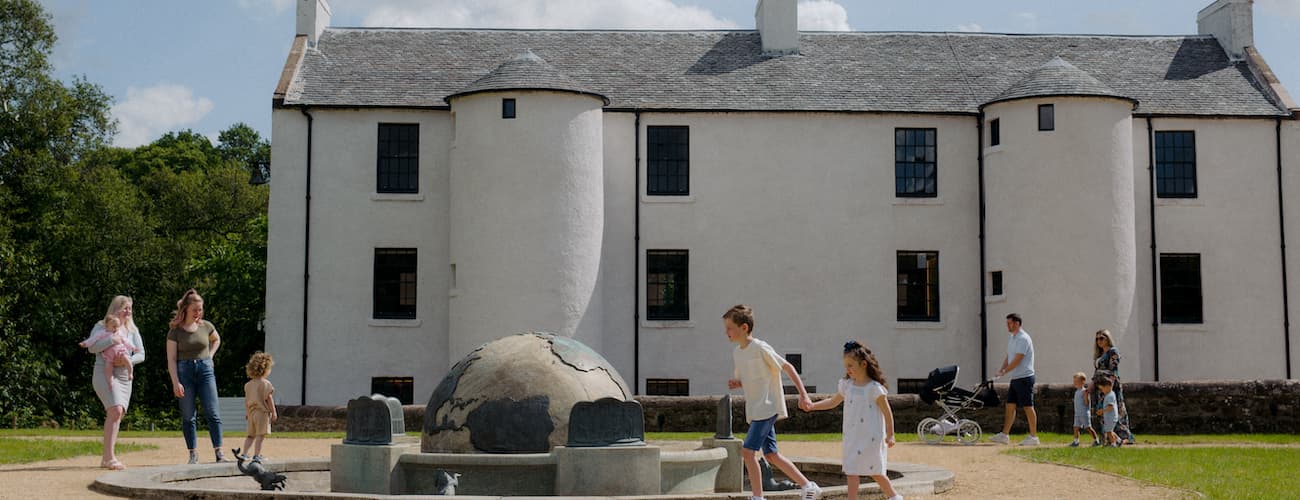Mini Series - Tunya Investigates! Episode 2 - Factory Life
Hello and welcome to another episode of Tunya Investigates!
Today we're talking about David's childhood in Blantyre. What did he get up to every day? What were his interests? What were his family like? When did he start working at the mill? What kind of child would David be if he was growing up today?
For answers to all these questions, listen to this second episode of Tunya Investigates!
Transcript
Tunya: Hello and welcome to Tunya Investigates! Which is part of the David Livingstone Birthplace Podcast. Today I’m talking to our volunteer Marbeth, about David’s childhood in Blantyre. We hope you enjoy the programme and follow us on Facebook and Twitter for more episodes.
Hello Marbeth! Thanks so much for talking to me today. Could you tell me a little bit about your role in the birth room project? And also, how long have you been working with the museum?
Marbeth: Hello Tunya, yes I’m happy to tell you that. I’ve been David Livingstone Birthplace since 2012. So almost 8 years now. Obviously, we’re not doing anything much just now, but we’re looking forward to getting the birth room up and running. The idea of the birth room project will be to make it look as though the Livingstone’s have just stepped out of the room, so we’re concentrating on what their life would be like, what their clothes would have been like, what their food would’ve been like, and even some of the toys the children might have played with.
Tunya: And from your research, can you tell us what a day in the life of young David Livingstone would’ve looked like? When he woke up, how many hours he would’ve worked, what kind of things he had to do?
Marbeth: When David was a little boy, there was only really him and his brother, because there’s five years between David and his next sister. So, there would only have been the two children: John and his brother David. John would’ve gone to work when he was six, but David would’ve been six in 1819 and a Factory Act at that time prevented children of that age from working, so David couldn’t go to work until he was at least nine. So, he had some years there, a bit different to everybody else, he had to amuse himself.
The family in general would’ve been up very very early because people going to work in the mill would be starting at 6am. So, David would’ve been up and about, he would’ve helped him mum with things, bringing up water, there was no water in the rooms so they would’ve had to carried water up, bringing up fuel for the fire, things like that. But David would’ve had a lot of free time. And we know that he liked to read. He liked to read a lot. He liked scientific things, he liked botany in particular, so David would’ve been off out looking at grasses, looking at plants, trees and studying all of that. So, a slightly different life possible to what children would've had up until that time.
When he was 10, he did start working in the mills. He started as what we call a piecer, which meant he worked round and about the machinery, he brought new spools, he took full spools away, he might've had to joining broken threads. Things like that. And after some time, he would become a spinner.
Tunya: That’s interesting, so David actually had quite a lot of freedom up until the age of 10 when he had to go and work at the mill. And what about some of David’s other family, like his sisters, do you think life was very different for them because they were girls?
Marbeth: His sisters were quite a lot younger than him. He was actually ten when his youngest sister was born. His next sister Janet was five years younger than him, then he had a brother Charles, and then he had a littler sister called Agnes. And yes, the girls would have had a much different time...children were encouraged to play outside, the games they would’ve played outside would’ve been very similar: hopscotch, rolling a metal hoop or a wooden hoop, just playing ordinary kind of games, skipping and things like that.
But inside it would’ve been very different. Any toys the children would’ve had would be homemade. They would’ve had things like dominos, noughts and crosses. If they were lucky, they might've had a kaleidoscope. If they were very lucky, they might’ve had a toy theatre, and on the toy theatre they’d have been able to put on plays, pantomimes maybe, but possible other than that it would’ve been bible stories. Games would all have been designed to improve them, not just for fun. Dominoes would be helping with the counting for example.
The girls, might have had a toy tea set if they were lucky. They might have had dolls. They did a lot of sewing, they would’ve sewn samplers, they would’ve helped with the making of their own clothes...so yes, the girls' toys or playthings were more towards “improving” them and teaching them skills for when they were grown up women, whereas the boy would’ve been allowed a bit more space to play.
Tunya: That’s very interesting thank you. And do you know much about what Blantyre would’ve been like at the time?
Marbeth: Blantyre would’ve been very much a country area. Right up until the 1970s, there were areas of Blantyre still called after farms...so it had been very much a rural area. The mills I think would’ve come along and been built, really independently of the town. In old photographs, we can see just above where the current David Livingstone Birthplace is, two small houses which would’ve been toll houses. So, you had to go in to the mills, it was separate to the town. The river was very important, it was important to the mills. It was also important to the village. We know David and his brother went fishing in the river for example. And there was a boat across the Bothwell on the other side. The communities of Bothwell and Blantyre were quite well linked. Very much more rural than it is now.
Tunya: That sounds really lovely, thank you. I wonder what David would’ve been like if he’d been a child today in Blantyre, or elsewhere...his life would have been very different I think – what do you think?
Marbeth: Yes, his life would’ve been very different, I’ve been thinking about this. David was quite a determined child. He liked to read, his older brother teased him a lot about his reading and I think possibly so did other children. Children didn’t have a lot of ambition in these days, whereas now of course children look ahead to what life holds for them and what they can do. I do think nowadays David would’ve been keen on outdoor pursuits. I can imagine him wanting to walk the West Highland Way. Or things like that, I can imagine him doing that. Um I don’t know that he was a sporty boy particularly...But I think the outdoors would’ve appealed to him. I think he would've taken the opportunity to get out and about.
I think he’d still have been close to his family. But yeah, I think he still would’ve stuck out a bit. He was very determined and you know, he did it his way.
Tunya: Hmm...Yes, I think so too. And do you think he would’ve still become a doctor?
Marbeth: I think he would still have had big ambitions. The big thing about David was that he was very much driven by his religion and we have to remember that. Religious upbringings today are not so common and very different. He wanted to serve God and the medical interest was all part of that. So, I think that’s got to have been very different then than it would be now. Yes, I think he might have aspired to do something like that. He would’ve had better educational opportunities so, why not?
Tunya: Ah that’s so interesting...And we’ll be talking about religion in the next episode of the podcast, so I’m glad you mentioned it.
Thanks so much for talking to me today, are you looking forward to the opening of the museum next year?
Marbeth: I’m very excited, it’s been a long long gap. Much much longer than we anticipated and as I said I certainly have done quite a lot of research for the birth room, but that’s been restricted. I had planned this year to go out to so many other places and look at how other people did things. I have picked up some play things that I’ve been able to get my hands on, but I would’ve liked to have seen so much more. So, it’s going to be tough. We’ve not got much time and we’ve got an awful lot to do...but yeah, looking forward to it. I just so want it all to be opened and working and visitors coming in again, it’ll be super.
Tunya: Me too, I’m so excited! I look forward to seeing you there soon. And thanks so much again for talking to me today Marbeth, it’s been a really interesting conversation.
That was the second episode of Tunya Investigates! Join us next time, when we’ll be talking about David Livingstone’s Religion with another one of our lovely volunteers and Trustee Douglas. I hope you enjoyed the programme and once again follow us on Facebook or Twitter if you want to hear more about me Tunya and our other learning activities. Thanks very much, bye!






